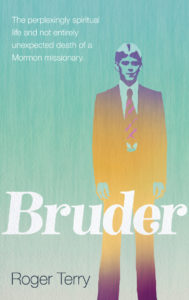 Title: Bruder: The Perplexingly Spiritual Life and Not Entirely Unexpected Death of a Mormon Missionary
Title: Bruder: The Perplexingly Spiritual Life and Not Entirely Unexpected Death of a Mormon Missionary
Author: Roger Terry
By Common Consent Press, 2019
233 pages
Reviewed by David Cook
Generally, I am skeptic when it comes to missionary memoirs and how to books on missionary work. Occasionally when visiting Utah I will go to Deseret Book and peruse the missionary section and am always disappointed. Missionary work has been a big part of my life. I served as a young man in New York City (Spanish). I have served as a counselor to 4 mission presidents and most recently as a mission president in Santiago, Chile. So I have seen a lot of the good, the bad and the ugly as well as the marvelous and miraculous.
Although I don’t know Roger Terry, we graduated from rival high schools in Ogden, UT. He is a couple of years older than me but I am sure we probably bumped into each other in local sports. He served in Germany approximately the same time I served in New York so the methods and philosophies of missionary work were very similar during our service. I say this only by way of background to my understanding of his experience.
Terry uses the literary style of referring to the missionary as Bruder Terry, but the author is not the same person. Although RM’s don’t talk this way it is entirely accurate as the maturation process takes place. As any missionary will attest, the end of one’s mission is like a death. In our mission our missionaries even referred to the approaching end of a mission as death.
I sometimes refer to the late 70’s- 80’s as the dark days of missionary work. There were some serious aberrations that were implemented in varying degrees across the world. Much of it came from Alvin R. Dyer’s book “The Challenge”. I read it before and during my mission. Fortunately, I had a mission president that was never given to fads or supposedly new methods. He was all about faith, obedience, work and above all humility. He recoiled at business methods that some missions were implementing. As Terry experienced the Dyer methods were passed around from missionary to missionary and mission to mission. Like Terry I ultimately discarded many of the Dyer methods as the “philosophies of men.”
Reading Bruder I laughed and cried and remembered my experiences, the joy and the despair, the confidence and self doubt. Reading of his experience with investigators, members and companions transported me to the humble ghetto apartments that I lived in during my mission and the kitchens and living rooms we taught in. I literally sat and cried remembering companions and people that I came to love like family.
I particular enjoyed reading of the experiences of Bruder Terry but mostly his evolution as a missionary and the maturation of his relationship with God and the Church. I hope some day to meet Roger Terry and thank him for his tremendous contribution.
